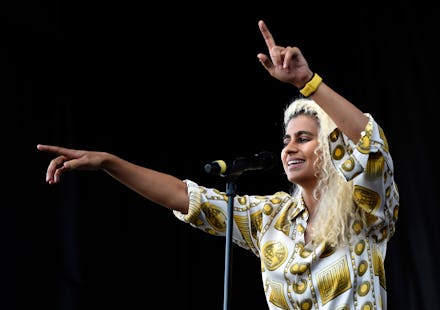Madame Gandhi on her 'Voices' EP and using music to realize a future that's female

When most of the world first met Kiran Gandhi, she was running the 2015 London Marathon, bleeding freely from her vagina. She chronicled the story in an essay, written on Medium and shared by Mic, as a way to raise awareness about period stigma.
It made headlines across the web, initiating a globe-trotting path that's included partnerships with socially conscious brands and organizations like Thinx, ZanaAfrica and Binti, speaking engagements at conferences like South By Southwest and Women Deliver and, of course, performance opportunities.
She is first and foremost a musician, after all.
The Harvard Business School graduate and multi-hyphenate has traveled all over the world as a touring musician with M.I.A. and Thievery Corporation. Her latest effort is Voices, the debut five-track EP from her group Madame Gandhi, which showcases Gandhi drumming, singing, promoting feminist values and confronting the status quo over electronic soundscapes.
It wasn't until the story of her marathon experience went viral that she felt confident enough to record her own project.
"I've always wanted to express myself," Gandhi told Mic over the phone. "I've always had ideas about the way the world should be when it comes to gender equality, and I finally have the courage to do so because my marathon story resonated so much around the world."
Set to music, the message she's worked to promote throughout all her projects gains a new urgency.
The songwriting on Voices alternates between both the personal and the political, with Gandhi's message of female empowerment serving as the prism through which the songs unfold. The message is clearest on "The Future Is Female," a driving manifesto of Gandhi's vision for gender equality that incorporates knocking percussion, spoken word and pointed raps targeting patriarchal power structures and making calls for real liberation.
"In the song itself I say, 'I want to live in a world that's collaborative, a world that is emotionally intelligent, a world in which we are linked in that way,' and the reason I say that is because I do believe there is so much we can learn from the female archetype," Gandhi said.
Part of the current feminist struggle, as Gandhi sees it, is that in addition to the consistent political oppression of women, there's also a widespread devaluing of archetypically female traits.
"If we loved what was feminine, I think it would enable all of us to be our best selves instead of repressing female qualities and exaggerating male qualities," Gandhi said.
The project solicits contributions from a range of luminous female musicians, including Merrill Garbus of Tune-Yards, who offered Gandhi recording time at her Oakland, California, studio.
Gandhi also enlisted the help of friend and sound designer Alexia Riner. She met the producer and Berklee College of Music graduate the same year she graduated Harvard, but she said their friendship and collaboration blossomed after both relocated to Los Angeles.
"We kind of talk about how she helps be a vessel for my ideas," Gandhi said. Their collaboration yields strong tracks like "Gandhi Blues" — a brooding, lovelorn ballad that deftly combines ambient textures with Gandhi's excellent, understated drumming — and "Moon in the Sky," which arranges Gandhi's vocal samples into a playful, meditative jam.
The fact that the two kept most of the beat-making in-house and came up with such a sonic range is seemingly a point of pride, and it flies in the face of the perception that the technical aspects of music-making must be male-driven.
"People who hear a Madame Gandhi track are like, 'Oh, so who's the producer? Where's the dude?'" Riner told Fusion. "They expect it to be some white man making all the beats and we're like, 'No, that's actually us. We made those.'"
Of all her talents, Gandhi believes music has a unique power to communicate progressive values to its listeners when sewn into the lyrics and notes of songs.
"[Music] triggers them in a place that's far deeper than when a politician or someone in general is speaking to them," Gandhi said. "Music makes someone feel moved, makes someone feel emotional, makes someone feel vulnerable — and that's a far more powerful source of fuel."
She cites artists like Tracy Chapman, Lauryn Hill and Fela Kuti as figures that sparked her own interest in activism and inspired her to think more critically about her place in the communities in which she lives.
This album is only the beginning. With plans to continue touring and recording more songs, the project is simply a starting point for Gandhi as she continues to advocate for a society that empowers women with equal opportunity in every aspect.
"I really think if we gave women the space to lead, and we gave women the chance to access their fullest potential, I think we'd live in such a better world," Gandhi said. "I really want to eliminate all of the insecurities and undermining of women we see today."